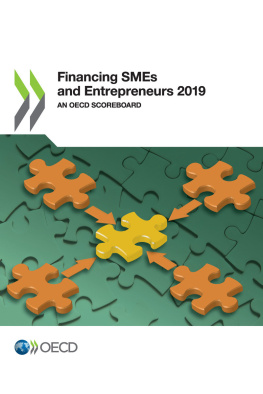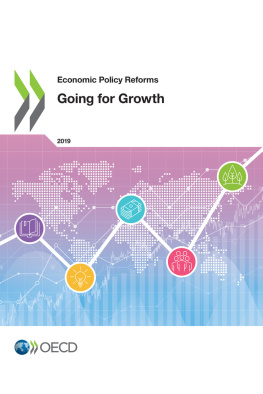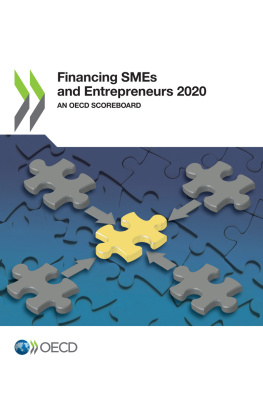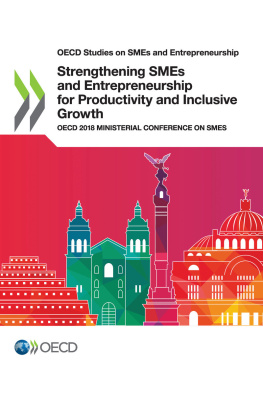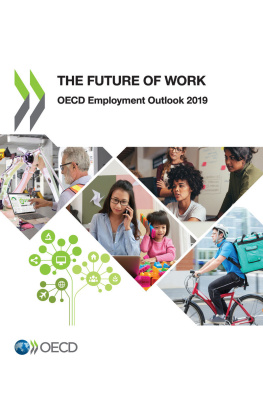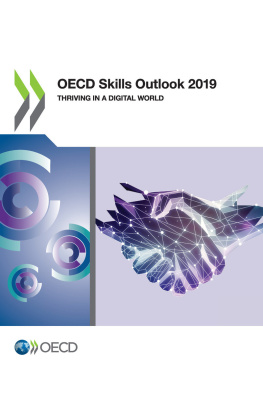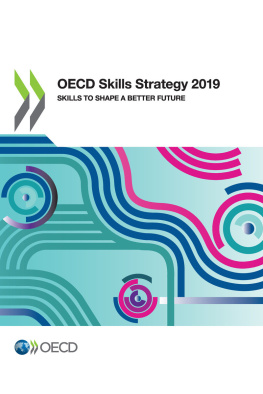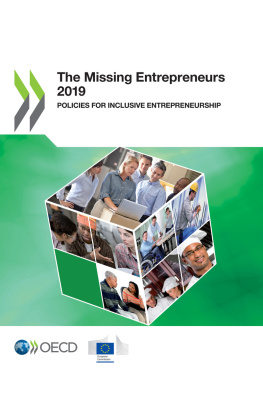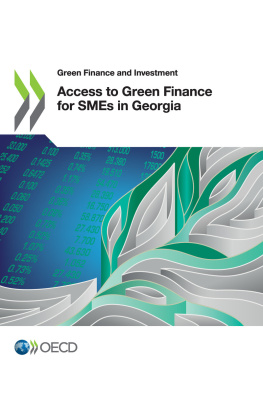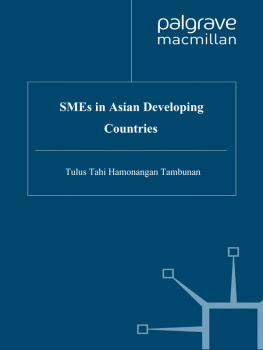OECD - Financing SMEs and Entrepreneurs 2019
Here you can read online OECD - Financing SMEs and Entrepreneurs 2019 full text of the book (entire story) in english for free. Download pdf and epub, get meaning, cover and reviews about this ebook. year: 2019, publisher: OECD Publishing, genre: Politics. Description of the work, (preface) as well as reviews are available. Best literature library LitArk.com created for fans of good reading and offers a wide selection of genres:
Romance novel
Science fiction
Adventure
Detective
Science
History
Home and family
Prose
Art
Politics
Computer
Non-fiction
Religion
Business
Children
Humor
Choose a favorite category and find really read worthwhile books. Enjoy immersion in the world of imagination, feel the emotions of the characters or learn something new for yourself, make an fascinating discovery.
Financing SMEs and Entrepreneurs 2019: summary, description and annotation
We offer to read an annotation, description, summary or preface (depends on what the author of the book "Financing SMEs and Entrepreneurs 2019" wrote himself). If you haven't found the necessary information about the book — write in the comments, we will try to find it.
OECD: author's other books
Who wrote Financing SMEs and Entrepreneurs 2019? Find out the surname, the name of the author of the book and a list of all author's works by series.
Financing SMEs and Entrepreneurs 2019 — read online for free the complete book (whole text) full work
Below is the text of the book, divided by pages. System saving the place of the last page read, allows you to conveniently read the book "Financing SMEs and Entrepreneurs 2019" online for free, without having to search again every time where you left off. Put a bookmark, and you can go to the page where you finished reading at any time.
Font size:
Interval:
Bookmark:
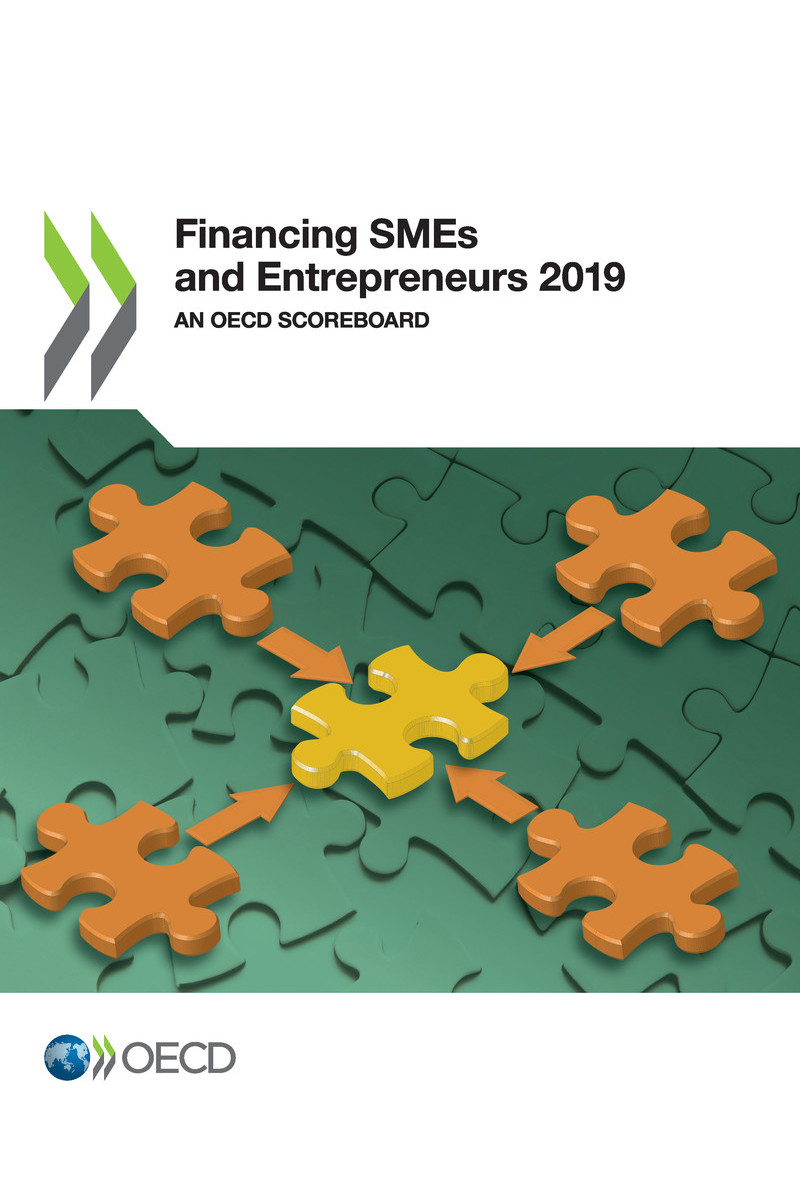
OECD (2019), Financing SMEs and Entrepreneurs 2019: An OECD Scoreboard , OECD Publishing, Paris.
https://doi.org/10.1787/fin_sme_ent-2019-en
Since the financial crisis hit the world more than 10 years ago, the landscape for SME finance has evolved significantly. Credit availability for SMEs has gradually recovered in many countries, as interest rates have generally come down, credit conditions have improved and payment delays have declined. In recent years, we have also witnessed a significant increase in the use of alternative sources of finance by SMEs and entrepreneurs: financial instruments such as leasing, factoring and equity crowdfunding have seen volumes rise, contributing to the diversification of financing instruments and sources for SMEs, in line with the G20/OECD High Level Principles on SME Financing.
The 2019 edition of the OECDs annual report Financing SMEs and Entrepreneurs: An OECD Scoreboard, covers 46 countries across the globe and provides important information on a broad set of financing instruments at the disposal of SMEs. The report shows that these overall positive trends mask, nonetheless, very large cross-country variations. For instance, in countries that were most affected by the financial crisis, SME access to finance is still struggling to recover. In some large emerging economies, where the economic climate has remained difficult, indicators point to a deterioration in SME access to finance in recent years. Moreover, in a number of large developed economies, credit volumes have been sluggish, often because of subdued demand from SMEs that prefer to rely on internal funds or seek alternative forms of financing. There is also considerable variation in the uptake of instruments such as venture capital investments and online alternative finance, with potential for countries with less developed markets to expand these further.
This coincides with persistent finance gaps within the SME population: micro-enterprises, young firms, start-ups and innovative ventures are still more likely to be financially constrained. The report highlights how many countries have initiated or expanded initiatives to address persistent structural finance gaps confronted by SMEs in recent years, with the aim to strengthen their resilience and embrace digital opportunities. In this context, the adoption of a suitable regulatory framework or the development of targeted policies to foster the Fintech industry have become more widespread in recent years.
The 2019 Financing SMEs and Entrepreneurs: An OECD Scoreboard is an important tool to enable policy makers to monitor developments, and ensure policies keep pace with fast-moving evolutions in the SME finance environment. This is all the more important in the current fragile macro-economic context, including the slowdown in global trade. Looking ahead, we are working to further enrich the information and analysis through the collection of more granular data, including by firm size, sector, age or region and by characteristics of the business owner. This Scoreboard constitutes an important part of the OECDs contribution to governments in designing and implementing evidence-based and coherent SME and entrepreneurship policies. I am confident that it will support policy-makers in designing, developing and delivering, better SME policies for better lives.

Angel Gurra
OECD Secretary-General
Financing SMEs and Entrepreneurs 2019: An OECD Scoreboard provides information about SMEs and entrepreneurs access to finance over the period 2007-17. Based on data collected for the country profiles and information from demand-side surveys, this report includes indicators on debt, equity and asset-based finance, as well as on financing framework conditions, complemented by information on recent public and private initiatives to support SME access to finance.
Taken together, these indicators form a comprehensive framework for policy makers and other stakeholders to evaluate the financing needs of SMEs and entrepreneurs and to determine whether they are being met. This report also constitutes a valuable tool to support the design and evaluation of policy measures, and to monitor the implications of financial reforms on access to finance and financing conditions for SMEs more generally.
The 2019 report represents the eighth edition of this annual publication. It presents data for 46 countries: Australia, Austria, Belgium, Brazil, Canada, Chile, the Peoples Republic of China, Colombia, the Czech Republic, Denmark, Estonia, Finland, France, Georgia, Greece, Hungary, Indonesia, Ireland, Israel, Italy, Japan, Kazakhstan, Korea, Latvia, Lithuania, Luxembourg, Malaysia, Mexico, the Netherlands, New Zealand, Norway, Peru, Poland, Portugal, the Russian Federation, Serbia, the Slovak Republic, Slovenia, South Africa, Spain, Sweden, Switzerland, Thailand, Turkey, the United Kingdom and the United States.
Chapter one of this publication describes and analyses recent trends in SME and entrepreneurship finance, drawing on data provided by national experts from participating countries, as well as from external sources. It also provides an overview of major policy developments across scoreboard countries. Chapter 2 focuses on how to enable SMEs to leverage intangible assets, such as patents and other forms of intellectual property, to access finance, and includes an overview of policy initiatives in this area around the world. Chapter 3 contains the national profiles on SME and entrepreneurship finance trends, as well as information on relevant policies, for all 46 participating countries. The print edition of this publication includes a snapshot view with key facts and figures, while the expanded profiles can be accessed online.
Font size:
Interval:
Bookmark:
Similar books «Financing SMEs and Entrepreneurs 2019»
Look at similar books to Financing SMEs and Entrepreneurs 2019. We have selected literature similar in name and meaning in the hope of providing readers with more options to find new, interesting, not yet read works.
Discussion, reviews of the book Financing SMEs and Entrepreneurs 2019 and just readers' own opinions. Leave your comments, write what you think about the work, its meaning or the main characters. Specify what exactly you liked and what you didn't like, and why you think so.

